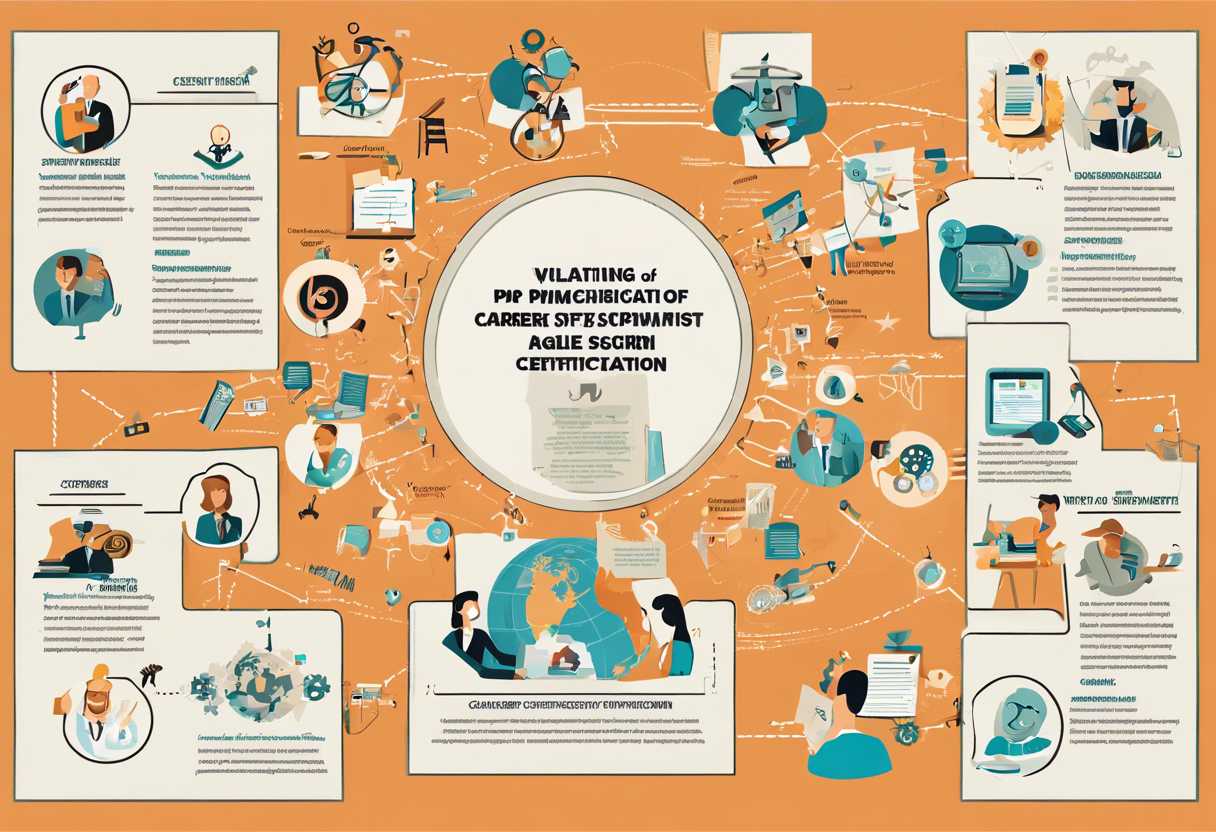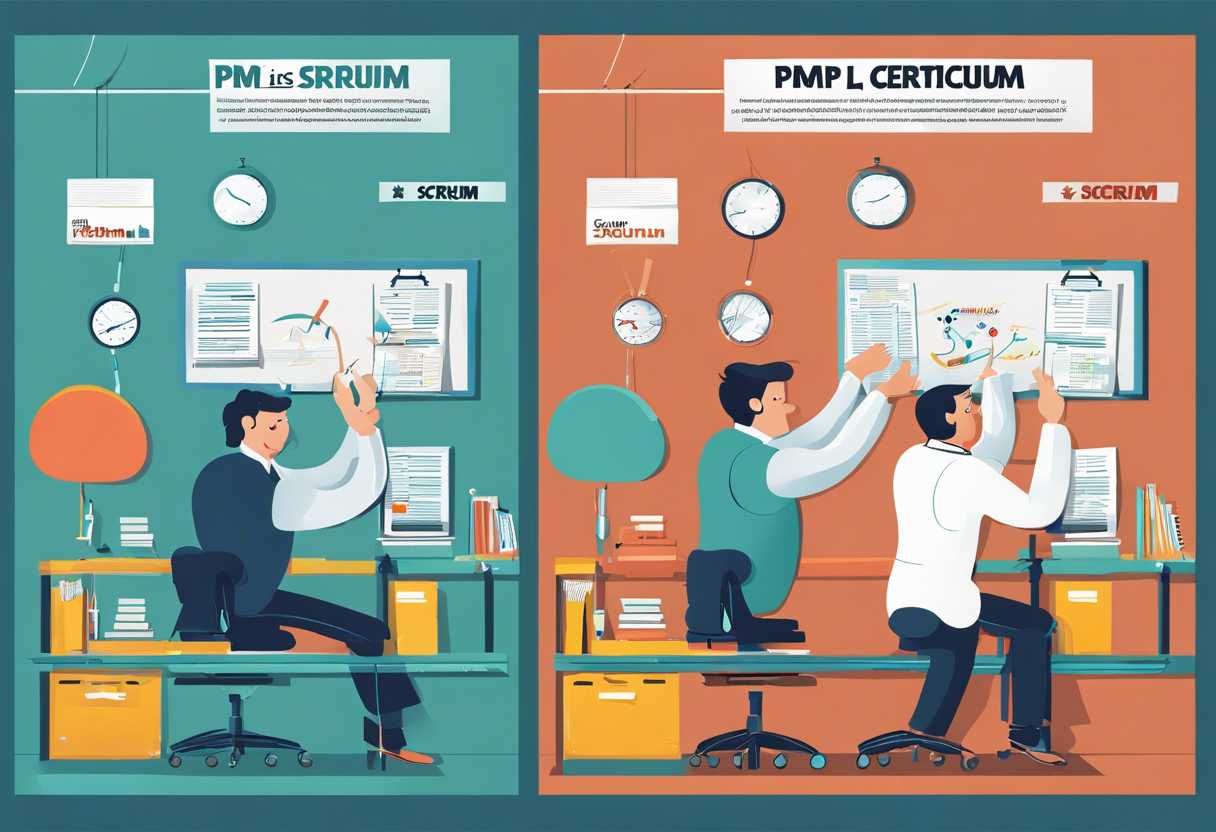Are you considering a career in project management and wondering which certification is better for you – PMP or Agile Scrum? Understanding the differences between these two certifications is crucial in making an informed decision that aligns with your career goals. In this blog post, we will evaluate the career benefits, exam structure, and industry demand for both PMP and Agile Scrum certifications. By exploring these key factors, you will gain valuable insights to help you decide which certification is the right fit for you. Let’s dive into the details and compare PMP and Agile Scrum certifications to help you make an informed decision.
Understanding the Differences Between PMP and Agile Scrum Certification
Overview of PMP Certification
PMP, or Project Management Professional, is a globally recognized certification for project managers. It is based on the Project Management Body of Knowledge (PMBOK) and focuses on the traditional waterfall approach to project management. PMP certification emphasizes a structured, sequential process for managing projects, with a strong emphasis on planning, execution, and control.
Overview of Agile Scrum Certification
Agile Scrum certification, on the other hand, is based on the Agile methodology, which is a more flexible and iterative approach to project management. The Scrum framework is a specific implementation of Agile, emphasizing small, cross-functional teams working in short cycles or sprints to deliver incremental value. Agile Scrum certification focuses on adaptability, collaboration, and continuous improvement.
Key Differences Between PMP and Agile Scrum Certification
- Approach: PMP certification follows a traditional, plan-driven approach, while Agile Scrum certification follows an iterative, adaptive approach.
- Focus: PMP certification emphasizes project management processes and knowledge areas, while Agile Scrum certification focuses on teamwork, collaboration, and delivering value.
- Flexibility: PMP certification is less flexible and more structured, while Agile Scrum certification is highly flexible and adaptable to change.

Evaluating the Career Benefits of PMP and Agile Scrum Certification
Advantages of PMP Certification
Obtaining a Project Management Professional (PMP) certification can significantly enhance your career prospects. PMP certification demonstrates your expertise in project management and can open doors to higher-paying positions and greater job opportunities. According to a survey by the Project Management Institute, PMP-certified professionals earn 25% more on average than their non-certified counterparts. Additionally, PMP certification is globally recognized, allowing you to pursue opportunities in various industries and countries.
Benefits of Agile Scrum Certification
Agile Scrum certification is another valuable credential for professionals in the project management field. Agile methodologies are increasingly popular in the business world, and Agile Scrum certification can set you apart as a skilled practitioner of these methodologies. Agile Scrum certification demonstrates your ability to lead Agile projects and adapt to changing requirements, making you an attractive candidate for organizations that prioritize flexibility and efficiency. With Agile Scrum certification, you can position yourself as a leader in the Agile movement and gain access to a wide range of career opportunities.
Comparing the Two Certifications
When evaluating the career benefits of PMP and Agile Scrum certification, it’s important to consider the specific skills and knowledge each certification emphasizes. PMP certification focuses on traditional project management practices and is ideal for professionals seeking to lead complex, large-scale projects. On the other hand, Agile Scrum certification is tailored to individuals who work in dynamic, fast-paced environments and are looking to master Agile project management methodologies. Depending on your career goals and the nature of your work, one certification may be more advantageous than the other.

Comparing the Exam Structure and Requirements for PMP and Agile Scrum Certification
Exam Structure
When comparing the exam structure for PMP and Agile Scrum certification, it’s important to note that the PMP exam consists of 200 multiple-choice questions that must be completed within a four-hour time frame. The questions are based on the PMBOK Guide and cover a wide range of project management topics. On the other hand, the Agile Scrum certification exam typically consists of 50 multiple-choice questions that must be completed within a 60-minute time frame. The questions focus specifically on Agile methodologies and Scrum framework.
Requirements
For PMP certification, candidates must have a minimum of 35 hours of project management education and 7,500 hours leading and directing projects, or 35 hours of project management education and 4,500 hours leading and directing projects if they hold a four-year degree. Additionally, candidates must pass the PMP exam and adhere to a code of ethics. In contrast, Agile Scrum certification requirements vary depending on the specific certifying body, but generally involve completing a training course and passing the certification exam.
Comparison Table
| Aspect | PMP Certification | Agile Scrum Certification |
| Exam Structure | 200 multiple-choice questions | 50 multiple-choice questions |
| Time Limit | 4 hours | 60 minutes |
| Requirements | 35 hours of project management education and 4,500-7,500 hours leading projects | Training course and certification exam |
Exploring the Industry Demand for PMP and Agile Scrum Certified Professionals
The Growing Need for PMP Certified Professionals
With the increasing complexity of projects in various industries, there is a growing demand for Project Management Professionals (PMP) who are equipped with the necessary skills and knowledge to effectively manage and lead projects. According to the Project Management Institute (PMI), organizations that employ PMP certified project managers are more likely to complete projects on time and within budget. This has led to a surge in the demand for PMP certified professionals across industries such as IT, construction, healthcare, and finance.
The Rise of Agile Scrum Certified Professionals
Agile Scrum has gained popularity as a project management methodology that emphasizes flexibility, collaboration, and continuous improvement. As a result, there is a growing demand for professionals who are certified in Agile Scrum practices. Organizations are increasingly adopting Agile Scrum to streamline their project management processes and deliver high-quality products and services to their customers. This has led to a surge in the demand for Agile Scrum certified professionals in industries such as software development, marketing, and manufacturing.
The Competitive Advantage of Dual Certification
Professionals who hold both PMP and Agile Scrum certifications have a competitive edge in the job market. They are equipped with a comprehensive skill set that allows them to effectively manage projects using traditional and agile methodologies. Employers value professionals who can adapt to different project management approaches and drive successful project outcomes. As a result, the demand for dual-certified professionals is on the rise, with many organizations seeking individuals who can bridge the gap between traditional project management and agile practices.
Comparing PMP and Agile Scrum Certification
Understanding the Differences
When considering a project management certification, it’s important to understand the differences between PMP and Agile Scrum. PMP, or Project Management Professional, is a globally recognized certification that focuses on traditional project management methodologies. On the other hand, Agile Scrum is a more flexible and iterative approach to project management, emphasizing collaboration and adaptability. Understanding the fundamental differences between these two certifications is crucial in making an informed decision.
Benefits and Applications
Both PMP and Agile Scrum certifications offer unique benefits and have different applications in the project management field. PMP certification is ideal for professionals who work in industries with strict regulations and compliance requirements, such as construction or healthcare. It provides a comprehensive understanding of project management processes and best practices. On the other hand, Agile Scrum certification is well-suited for industries that require quick adaptation to changing requirements, such as software development or marketing. It emphasizes continuous improvement and customer collaboration, making it a valuable asset for agile project management teams.
Choosing the Right Certification for You
Ultimately, the decision between PMP and Agile Scrum certification depends on your career goals, industry, and the type of projects you work on. If you prefer a structured approach to project management and work in a regulated industry, PMP certification may be the right choice for you. However, if you thrive in a dynamic and collaborative environment and work on projects with evolving requirements, Agile Scrum certification could be more beneficial. Consider your professional aspirations and the specific needs of your industry when making this important decision.
Conclusion
After exploring the key differences between PMP and Agile Scrum certification, evaluating their career benefits, comparing exam structures and requirements, and examining industry demand, it’s clear that both certifications offer unique advantages for professionals in the project management field.
While PMP certification is recognized globally and demonstrates a strong foundation in traditional project management methodologies, Agile Scrum certification showcases expertise in agile methodologies and iterative project management approaches.
Ultimately, the decision between PMP and Agile Scrum certification should be based on individual career goals, industry trends, and personal preferences. Professionals seeking to advance their careers in traditional project management may find PMP certification to be the ideal choice, while those interested in agile methodologies and iterative project management may benefit from Agile Scrum certification.
Regardless of the chosen certification, it’s important for professionals to stay informed about industry trends, continuously develop their skills, and seek opportunities for professional growth. Both PMP and Agile Scrum certification can open doors to new career opportunities and enhance professional credibility.
As the project management landscape continues to evolve, professionals should consider the value of obtaining both PMP and Agile Scrum certification to broaden their skill set and remain competitive in the industry.
Ultimately, the decision between PMP and Agile Scrum certification is a personal one, and professionals should carefully weigh the benefits of each certification to make an informed choice that aligns with their career aspirations.
Whichever path professionals choose, pursuing certification in project management demonstrates a commitment to excellence and continuous improvement, setting the stage for a successful and fulfilling career in the dynamic field of project management.
Are you ready to take the next step in your project management career? Consider the insights shared in this blog post and make an informed decision that will propel your career forward.

